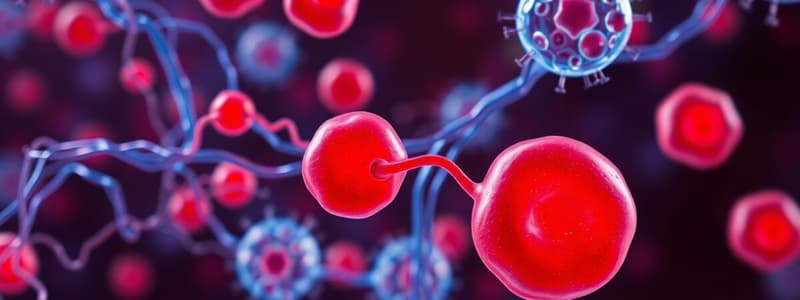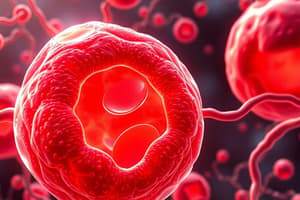Podcast
Questions and Answers
Which of the following is NOT a characteristic of leukemias?
Which of the following is NOT a characteristic of leukemias?
- They can be treated with bone marrow transplantation.
- They typically involve the abnormal accumulation of lymphoid cells. (correct)
- They are cancers of blood or blood-forming tissues.
- They are characterized by uncontrolled proliferation of abnormal white blood cells.
What is the primary function of the hematopoietic niche microenvironment?
What is the primary function of the hematopoietic niche microenvironment?
- To regulate red blood cell production.
- To ensure proper stem cell function and differentiation. (correct)
- To transport mature blood cells to the circulation.
- To produce platelets.
Which of the following statements BEST describes the relationship between hematopoiesis and blood disorders?
Which of the following statements BEST describes the relationship between hematopoiesis and blood disorders?
- Hematopoiesis is only relevant for understanding the development of red blood cells.
- Hematopoiesis plays a minor role in the diagnosis and treatment of blood disorders.
- Hematopoiesis has no direct relationship to blood disorders.
- Hematopoiesis is essential for understanding and treating various blood disorders. (correct)
Which of the following is a potential treatment option for certain blood cancers and disorders?
Which of the following is a potential treatment option for certain blood cancers and disorders?
What is the main purpose of bone marrow biopsies?
What is the main purpose of bone marrow biopsies?
What is the primary function of the erythroid lineage of blood cells?
What is the primary function of the erythroid lineage of blood cells?
Where does hematopoiesis primarily occur in an adult?
Where does hematopoiesis primarily occur in an adult?
Which of the following factors does not directly impact hematopoiesis?
Which of the following factors does not directly impact hematopoiesis?
Which of the following blood cell types is not part of the myeloid lineage?
Which of the following blood cell types is not part of the myeloid lineage?
During embryonic development, where does hematopoiesis initially occur?
During embryonic development, where does hematopoiesis initially occur?
Which of the following is not a characteristic of hematopoietic stem cells (HSCs)?
Which of the following is not a characteristic of hematopoietic stem cells (HSCs)?
What is the role of the hematopoietic niche in the bone marrow?
What is the role of the hematopoietic niche in the bone marrow?
Which of the following best describes the role of growth factors in hematopoiesis?
Which of the following best describes the role of growth factors in hematopoiesis?
Flashcards
Hematopoietic Niche
Hematopoietic Niche
The microenvironment that supports stem cell function and differentiation in blood cell production.
Anemias
Anemias
Conditions characterized by reduced red blood cell production or diminished function.
Leukemias
Leukemias
Cancers involving uncontrolled proliferation of abnormal white blood cells.
Bone Marrow Function
Bone Marrow Function
Signup and view all the flashcards
Thrombocytopenia
Thrombocytopenia
Signup and view all the flashcards
Hematopoiesis
Hematopoiesis
Signup and view all the flashcards
Hematopoietic Stem Cells (HSCs)
Hematopoietic Stem Cells (HSCs)
Signup and view all the flashcards
Embryonic Hematopoiesis
Embryonic Hematopoiesis
Signup and view all the flashcards
Adult Hematopoiesis
Adult Hematopoiesis
Signup and view all the flashcards
Erythroid Lineage
Erythroid Lineage
Signup and view all the flashcards
Myeloid Lineage
Myeloid Lineage
Signup and view all the flashcards
Growth Factors
Growth Factors
Signup and view all the flashcards
Hematopoiesis Regulation
Hematopoiesis Regulation
Signup and view all the flashcards
Study Notes
Overview of Hematopoiesis
- Hematopoiesis is the process by which all blood cells are formed.
- It occurs throughout life, beginning during embryonic development.
- Different blood cell types originate from distinct hematopoietic stem cells (HSCs).
- Stem cells mature into various committed progenitor cells, each specifying a particular blood cell lineage.
Stages of Hematopoiesis
-
Embryonic/Fetal Hematopoiesis:
- Begins during early embryonic development, initially in the yolk sac.
- This is followed by the liver and spleen taking over hematopoietic functions.
- Later, bone marrow becomes the primary site of hematopoiesis.
-
Adult Hematopoiesis:
- Primarily occurs in the bone marrow.
- The majority of blood cell formation happens in the red bone marrow.
- Hematopoiesis is a tightly regulated process.
Hematopoietic Stem Cells (HSCs)
- HSCs are multipotent cells responsible for the production of all blood cell types.
- They exhibit a remarkable capacity for self-renewal.
- HSCs reside in specific microenvironments within the bone marrow, termed the hematopoietic niche.
- This niche provides unique signaling cues and support for maintaining HSC function.
Blood Cell Lineages
- Blood cells can be classified into various lineages:
- Erythroid lineage (red blood cells): responsible for oxygen transport
- Myeloid lineage (white blood cells, including neutrophils, monocytes, eosinophils, basophils, and platelets): crucial for immunity and clotting
- Lymphoid lineage (lymphocytes, including B cells, T cells, and natural killer cells): vital for adaptive immunity
Factors Affecting Hematopoiesis
- Growth factors: Cytokines and hormones regulate the differentiation and proliferation of different blood cell lineages.
- Examples include erythropoietin (EPO) for erythroid lineage and granulocyte-colony stimulating factor (G-CSF) for myeloid lineage.
- Hormonal influences: Hormones like testosterone and thyroid hormone can impact hematopoiesis.
- Nutritional status: Adequate levels of nutrients like iron, folate, and vitamin B12 are essential for proper blood cell production.
- Genetic factors: Mutations or chromosomal abnormalities can lead to various hematopoietic disorders.
- Infections: Infections can disrupt the normal functioning of hematopoiesis.
- Environmental factors also influence hematopoiesis.
Regulation of Hematopoiesis
- A complex network of regulatory mechanisms controls hematopoiesis.
- Positive and negative feedback loops help maintain blood cell homeostasis.
- The hematopoietic niche microenvironment ensures proper stem cell function and differentiation.
Hematopoietic Disorders
- Anemias: Conditions affecting red blood cell production or function.
- Leukemias: Cancers of blood or blood-forming tissues, characterized by uncontrolled proliferation of abnormal white blood cells.
- Lymphoma: Cancers originating from lymphoid tissue, resulting in the abnormal accumulation of lymphoid cells.
- Thrombocytopenia: A decrease in platelet count, leading to bleeding disorders.
Bone Marrow Function
- Bone marrow houses hematopoietic stem cells and progenitors.
- Provides the appropriate microenvironment for blood cell development.
- Supports the maturation of various blood cells from precursor cells into mature cells in the circulation.
- Bone marrow biopsies are used to assess hematopoiesis and diagnose various blood disorders.
Clinical Significance
- Understanding hematopoiesis is crucial for diagnosing and treating various hematological disorders.
- Bone marrow transplantation is a potential treatment option for some blood cancers and disorders.
- Continuous research on hematopoiesis is essential for improving diagnostic tools and therapeutic approaches for blood cell disorders.
Studying That Suits You
Use AI to generate personalized quizzes and flashcards to suit your learning preferences.




